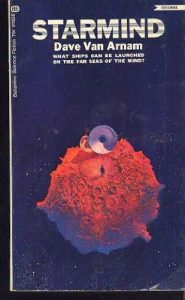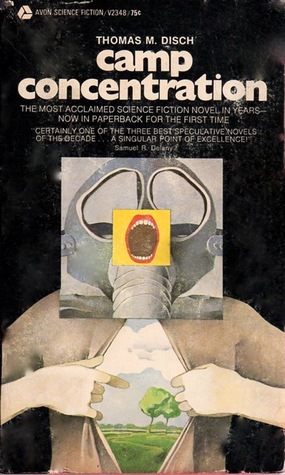
When selecting my novel, I was looking for something unique and different that I felt that a lot of sf stories tended to miss. I didn’t want your typical action-adventure soap opera that was characteristic of this genre — my mind tends to like stories that deal with issues of a more philosophical and existential nature. While lots of science fiction features voyages outward, searching for answers within the infinite cosmos, I believe that searching within one’s “inner space” is a much more productive and useful endeavor. The reason I chose Starmind was because of the tagline “What ships can be launched on the far seas of the mind?” because it speaks to the potential within one’s internal universe, and alludes to the immense power that is contained within each and every one of us, which is a topic that I personally find fascinating.
Starmind essentially tells the story of three characters — Jailyn Rost, a Martian princess with a rich family; Joe Winslow, an expert on the topic of multi-wave research and engineering, and Benjy Tyler, a 19-year old boy with an intellectual disability. Each of them were coincidently involved in three separate freak accidents, such that only one half of Jailyn’s brain, one half of Joe’s brain, and Benjy’s body were viable. As such, they were subject to the first double brain transplant in their history, and the three of them — as Benjy’s midbrain and cerebellum remained, so he was present to some degree — learned to coexist in one body and seek out their purpose in life, which culminates in them learning to manipulate the “multi-wave” using the power of their combined minds to discover faster-than-light interstellar travel.
While the premise of this novel may lead one to believe that this may be considered soft science fiction, as it deals with issues of the mind and “inner space”, I would place this book firmly in the category of hard sf. This is because it describes the various processes and happenings within the story with an extreme verbosity, chock full of technical jargon and many novums, so much so that I feel that it detracts from the original point of novel, serving only as a boring and annoying digression.
That being said, the highlight of this novel is observing the three personalities interacting with each other and learning to coexist. Here, Van Arnam does an excellent job of crafting vibrant characters that the reader can learn to love and root for. Everything else in my opinion could be ignored, as there were several sections of the novel that described various phenomena in extreme detail for seemingly no reason, which I found particularly frustrating. Additionally, the theme of sexuality appears over and over through this novel, sometimes in ways that are uncomfortable, and do not add much value to the story.
Overall while the premise of this book is very exciting and interesting, its execution leaves a bit to be desired. Some sections of the book can be difficult to get through, as the storytelling can get long-winded and uninteresting. It does pick up toward the middle of the story, however the final third of the book is a little difficult to understand. As a result I would only really recommend this book if you have spare time to kill and the idea of seeing how three minds interact in one body is of particular interest to you. Otherwise you most likely will not enjoy it much.
Van Arnam, Dave. Starmind. Ballantine Books, June 1969.
(Narmer Bazile)


